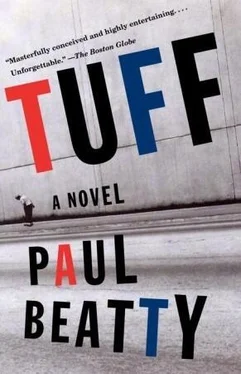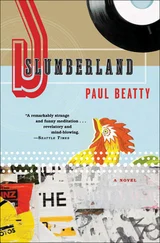“But the elevator in Carver ain’t never worked.”
“Exactly. You think those old people who were so proud of you at the debate are going to walk up eight flights of stairs to vote?”
So the volunteers wouldn’t hear, Winston mouthed, “How many votes I got?”
Inez flashed her fingers in sets of ten. It was either sixty-four or seventy-four, Winston having lost count.
With a sharp pinch Yolanda let him know the booth was ready. Winston, Jordy in his arms, entered the booth and closed the curtain behind him. He primed the ballot by moving the red lever to the right.
“Tuffy, that you?” It was Marvin whispering from the booth next to Winston’s.
“What up?”
“How you spell your name?”
“W-I-N-S-T-O — nigger can’t you read?” Exasperated, Winston began directing Marvin in a voice loud enough to lift the heads of the volunteers from their rosters. Following his own directions, he showed Marvin how to vote. “Put your finger on the top box in the first row of boxes.”
“Okay.”
“Go down to the third box.”
“All right.”
“See the little metal lever next to the box?”
“Yup.”
“Pull it down.”
“Done.”
“It’s a little black X in the box?”
“Uh-huh.”
“Pull the red handle to the left.” Without pulling his lever, Winston listened for the loud kerchunk of Marvin casting his vote. “There you go, son. You just voted.”
“That was easy. I should vote more often. When you running again?”
“Hopefully, never.”
“Winston.” Marvin’s voice had returned to its original hush. “About that twenty?”
“I’ll get you tomorrow. Come by the crib.”
“Promise?”
“Yeah, nigger.”
“Don’t be like the rest of them politicians, making promises you can’t keep.”
Winston didn’t worry about breaking any political promises. He figured there was no way for him to win.
Tuffy puzzled over the rest of the ballot. He examined the judge-ships, then voted for the surnames he thought sounded Jewish. He let Jordy flip the rest of the poll’s switches. In a local election with a pitifully low voter turnout, the baby’s whims would go a long way in determining the outcome of the assorted city offices, propositions, and referendums, the particulars of which Winston understood as much as Jordy. When he stepped out of the booth Yolanda looked so proud that for a moment he thought he had a chance to win.
Man, if I won, I wouldn’t even know where to show up for work .
The Foshays were sitting in the back row of a small art-house theater, sipping herbal teas and watching an Ozu film. The film, There Was a Father , was an early work and so absent of dialogue it might as well have been silent. From Yolanda’s perspective the slow-moving tale with its static camera work might as well have been a still photograph. “Winston, this movie’s awful. Ain’t shit happened since the kid drowned in the lake, and that was just a glimpse of an overturned boat in two feet of water.”
“Lots of things is happening. You just don’t how to look for them.”
“What, the old man getting even older? His son talking even less then he did when he was a boy? Long shots of stone statues? If nothing’s happening, then there’s nothing to miss.”
A brave viewer shushed the couple. Winston ignored the reprimand and explained the movie’s subtext to Yolanda. “You supposed to be a psychologist. Can’t you see the father going through some heavy shit? Nigger in crisis. He’s lonely. His wife been dead for who knows how long. His student died, he feels responsible, now he afraid to raise his son. The kid feels abandoned, but still got mad love for his pops. When you watch these shits it’s not about what’s happening, but what ain’t happening.” Onscreen, the father and son were fishing in a shallow stream, casting their lines, their poles moving in perfect sync, like windshield wipers. Without turning to face the boy, the father said, “I’m sending you away to school.” The boy stopped fishing while his father kept snapping his line into the water. “That’s deep as fuck,” Tuffy said in a loud voice. The audience launched a chorus of “Shhh”s and “Be quiet”s in his direction. But Winston was unshushable, and the chiding only encouraged him. “What you all crying about? None of y’all can’t understand Japanese no way.” His benshi -like exegesis continued unabated. “If you think about it, Landa, all I have to do is kill you and this movie be just like me and Jordy’s life. Father and son against the world.” Yolanda playfully slapped him across the jowls. A couple of patrons stormed out to alert the theater manager.
Winston looked at his beeper. Nothing from Fariq. He imagined Fariq and the others joyriding in the stolen Dodge, convinced the traffic helicopters flying overhead were the police radioing their whereabouts to the ground forces. They had rehearsed the plan of escape many times on the stoop: Drive by the airport, where the helicopters aren’t allowed to violate the airspace. If they weren’t near an airport, drive to the nearest college campus, park the car, and pile out. From five hundred feet up they’d look just like students.
Winston turned his attention to the film. The father was on his deathbed, the now full-grown son at his side, fighting back tears for a man he never really knew. As the father passed away quietly, the son left the room and began crying uncontrollably.
Winston’s eyes were moistening when Yolanda whispered in his ear: “Smush and them all right?”
He shrugged.
“You crying?”
“Naw.”
The son and his new bride were on a train to their new lives. The son suggested to his wife that she invite her father and her brother to move in with them. The woman sobbed into her hands at her man’s kindhearted resoluteness. Yolanda shook her head in disgust. “This movie is a trip. Japanese people must cry at the drop of a hat. They could never live in the ghetto. They’d be a fucking wreck.”
“Ms. Nomura live on the block, and she do all right.”
“Well, when the next movie start, let’s move up to the front a little bit?”
“We can’t. I have to sit behind my seat.”
“What do you mean, your seat?”
“I’ll show you in a sec.”
When the houselights slowly brightened, Winston tapped a small metal plate stapled to the seat back in front of him. Yolanda ran her hands over the silver-plated tag and sighed, “Unbelievable.” Neatly engraved into the plaque was WINSTON FOSHAY — PATRON OF THE THEATER FOR CLASSIC CINEMA. “That’s where all Ms. Nomura’s money went? How much that cost?”
“Two thousand dollars.”
“Winston, how much money is left?”
“About fifteen hundred.”
“Where the rest go?”
“I don’t know — beer, your tuition. And I gave Spencer five thousand.”
Yolanda stood up. “For what?”
“He’s going to be my screenwriter.”
Reentering the theater, the pack of disgruntled patrons pointed Winston and Yolanda out to the manager. Yolanda sat down in a huff, ready to take out her anger on the manager. “That’s them. Those two right there.” The manager slid into the seat next to the troublemakers. “How you doing, Mr. Foshay? Good to see you again.” The men shook hands and Winston introduced Yolanda and Jordy. “How did you like the film?” the manager asked. “Have you seen the next one, What Did the Lady Forget? It’s about a henpecked husband and how he regains the upper hand in his marriage.”
Winston groaned, “Oh, man, I seen this one,” then raised an eyebrow at Yolanda, who, fed up, had pulled out a psychology text, deciding she could study during the intermission. “He hits her and she straightens right up.” Yolanda ignored him and highlighted a passage with her fluorescent orange marker.
Читать дальше












